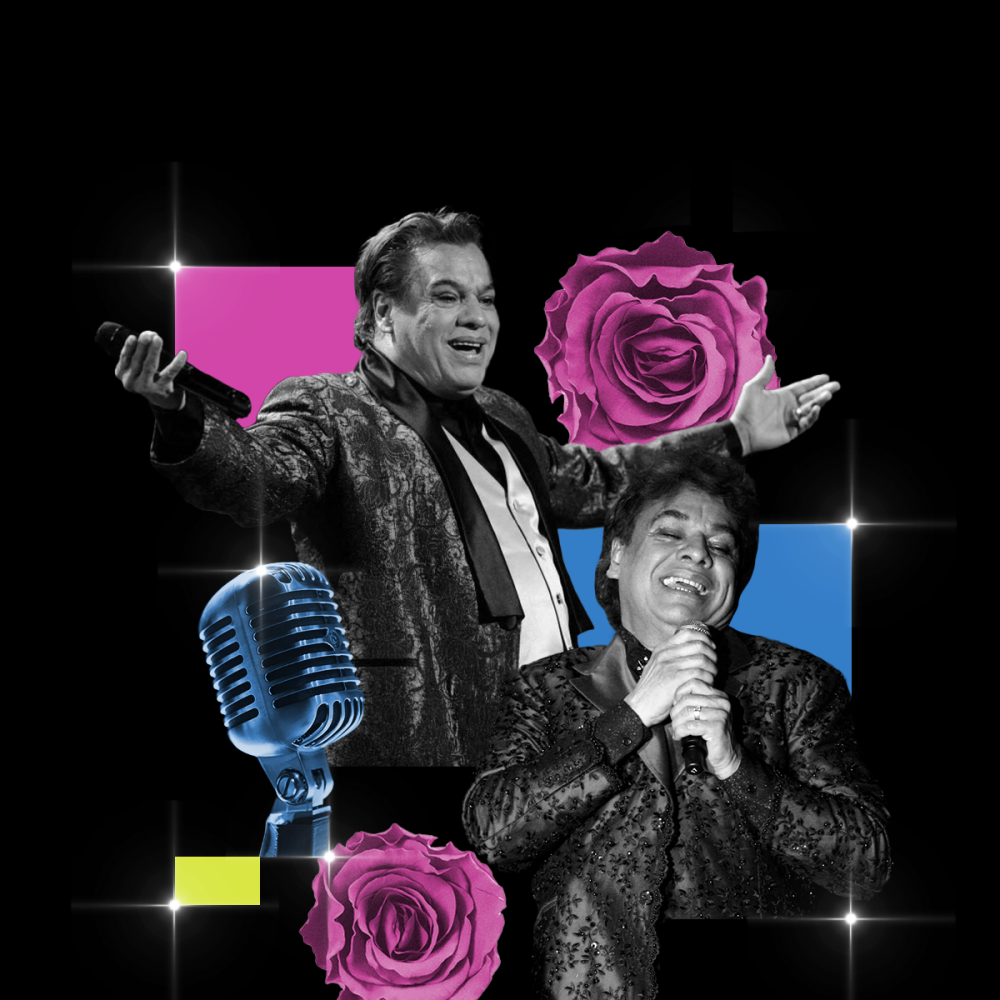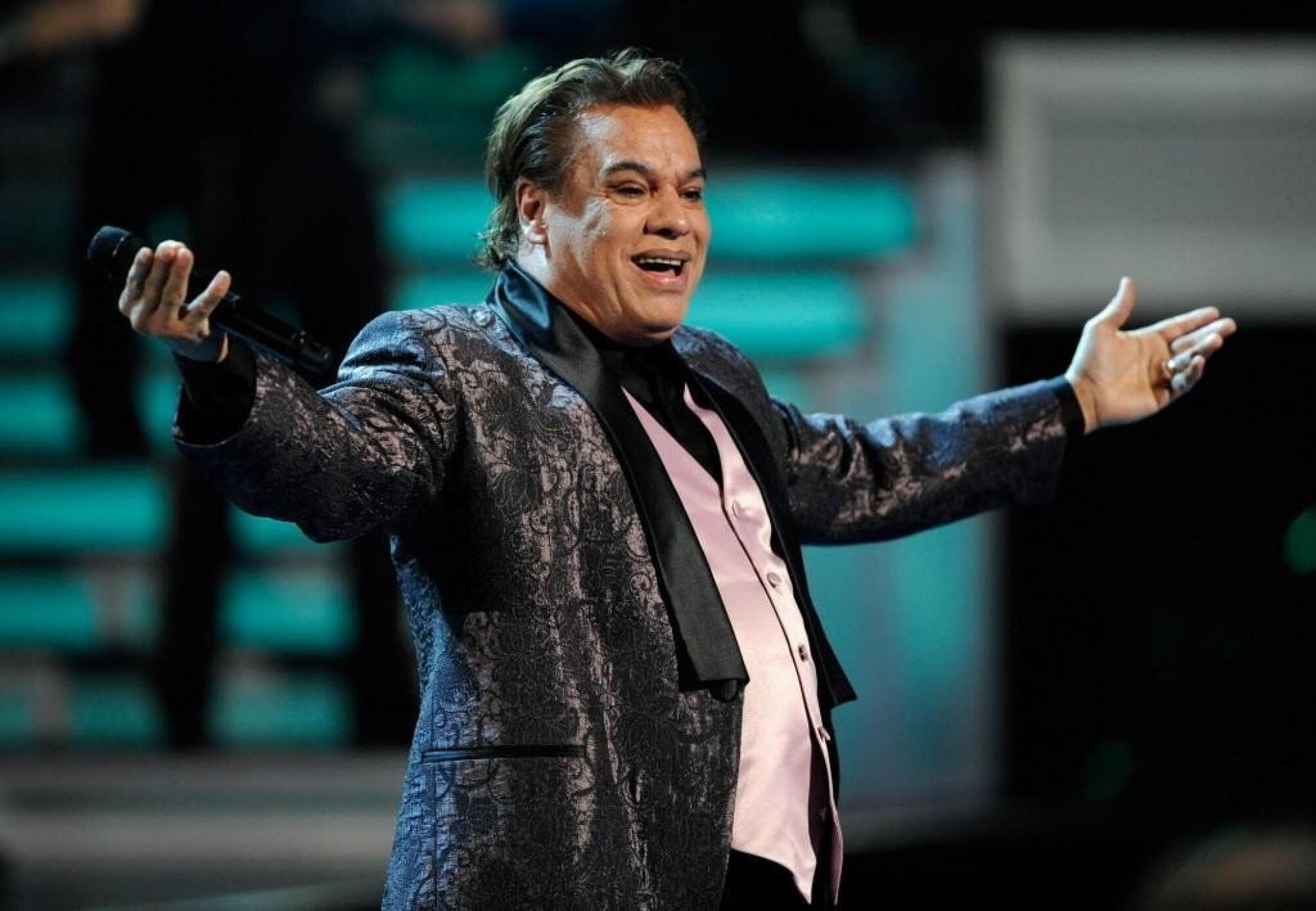
- Share via
As a queer woman born in Ciudad Juarez, Mexico, journalist Maria Garcia always felt drawn to Juan Gabriel.
“It feels like his legacy provides me with the clues to figure out this tension inside of me between these two identities,” Garcia said of the legendary Mexican singer and songwriter. That tension is explored in “Mi Divo,” a new Apple TV+ podcast hosted and executive produced by Garcia, in which she uses Gabriel’s story as a guiding light for her own personal reconciliation with generational family trauma and her identity.
It’s been five years since the death of the legendary Mexican singer.
The eight-part series — Apple TV+’s first dual-language podcast — premiered on Monday, with the first two episodes available for nonsubscribers. New episodes of “Mi Divo” are released weekly.
The podcast delves into Gabriel’s flamboyant personality, which ruffled against the Mexican patriarchy and often prompted media speculation over his sexuality. One example included in “Mi Divo” is Gabriel’s now-infamous 2002 interview with “Primer Impacto” reporter Fernando del Rincón, who asks if the singer is gay.
“They say that what you see, you need not ask,” Gabriel responded curtly. Despite the constant probing, he never came out to the public. Garcia points out that he also never outright denied being queer, and would often challenge the questions presented altogether.
“But Juan Gabriel onstage? Honey, that was queer exuberance,” Garcia said.
At the height of his career, el Divo de Juárez would don purple fringed suits, bright pink vests and silky suits.
“In its most potent, authentic, liberated way, Juan Gabriel onstage was truly free,” she added.
The youngest of 10 children, Gabriel — his real name was Alberto Aguilera Valadez — was born in Paracuaro, Michoacan. When he was a young child, his mother moved the family to Ciudad Juarez after her husband was interned at a psychiatric hospital. She would eventually surrender Gabriel to a local orphanage.
Raised in poverty, the singer has pulled himself up to the top of the Latin pop world. And while he’s tinkered with his musical style, this is one Spanish-language superstar with zero crossover dreams.
In a 1999 profile with The Times, Gabriel said that his first memory was of being abandoned by his mother.
“You don’t know the word for ‘abandon’ at that age,” Gabriel told former Times reporter Alisa Valdes-Rodriguez. “But you know what is happening. You know you want to be with your mother, and she is not there.”
Gabriel would harness his vocal gift and his ability to distill emotions core to the human condition into songs that have stood the test of time. Gabriel sold more than 100 million albums over his decades-long career, capturing the hearts of audiences on both sides of the border and of all types of sexual orientation with songs like “Así Fue,” “No Tengo Dinero” and “La Farsante.”
Despite his personal heartbreak, Gabriel’s capacity to love shone through his music. Valdes-Rodriguez says it was his “poignancy that is at an intersection of love and pain” that differentiated “JuanGa” from the rest.
“When you think about someone raised in an orphanage, abandoned, who rises to that level, that’s an exceptional soul, right?” He extended that strength to everyone and everything around him,” said Valdes-Rodriguez. “He saw the beauty in forgotten places and in the forgotten people.”
Gabriel eventually reunited with his mother, buying her a house soon after achieving fame. She served as the inspiration behind “Amor Eterno,” the mournful ballad that has since become a staple of funerals.

“I don’t think he was in denial or unaware of what happened to him,” said Valdes-Rodriguez. “It’s that he was able to forgive and love at a level that most of us can only aspire to.”
Garcia says Gabriel’s ability to forgive his mother despite the abandonment helped her cope with her own familial trauma. Like Gabriel, Garcia’s own mother was abandoned — she was forced to marry someone she did not know and was subjected to sexual abuse. As the podcast reveals, Gabriel was also the victim of such abuse.
“I saw both the pain and the resilience and the beauty of his healing, and I saw it in my mom. It was just a really cathartic moment,” Garcia said.
“Mi Divo” is intended to be a space of healing, Garcia says. By exploring the tragedies and triumphs surrounding the singer’s life, she’s been able to find comfort, peace and a sense of belonging. Her own narrative is as central to the story as Gabriel’s. It’s a creative decision that was also taken in “Anything for Selena,” a podcast series that examines the cultural significance of slain Tejano legend Selena Quintanilla. “Anything for Selena” — produced through Futuro Media and Boston’s National Public Radio affiliate, WBUR — was named Apple Podcasts’ show of the year in 2021.
Garcia says she decided to “show her cards” to the listener by becoming part of the story on both series.
“To not include [my own narrative] is dishonesty from my part as a journalist to the audience,” Garcia said. “I value radical transparency more than objectivity because objectivity doesn’t exist.”
And why focus on el Divo de Juárez this time around?” Because listeners began clamoring for it.
“After I finished [‘Anything for Selena’], it felt like providence, it felt like the universe [was manifesting it], because there were so many people on social media who started messaging me, ‘So, is Juan Gabriel next?’”
More to Read
The Latinx experience chronicled
Get the Latinx Files newsletter for stories that capture the multitudes within our communities.
You may occasionally receive promotional content from the Los Angeles Times.








